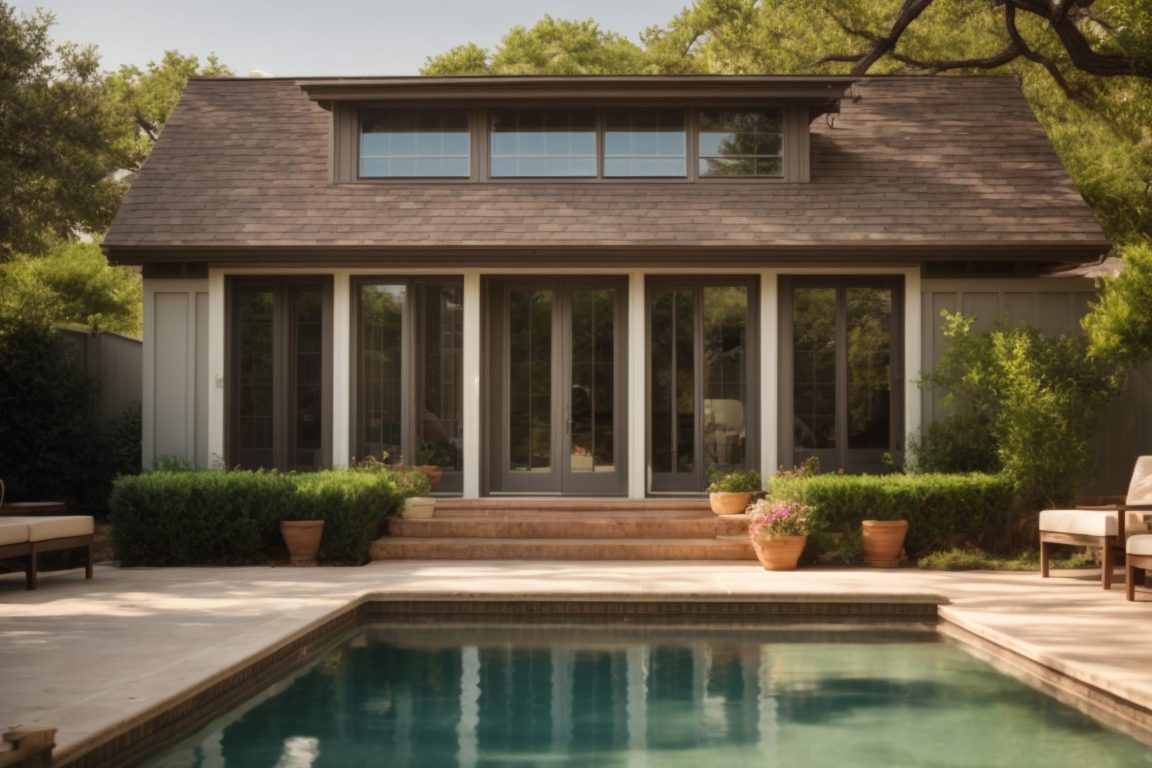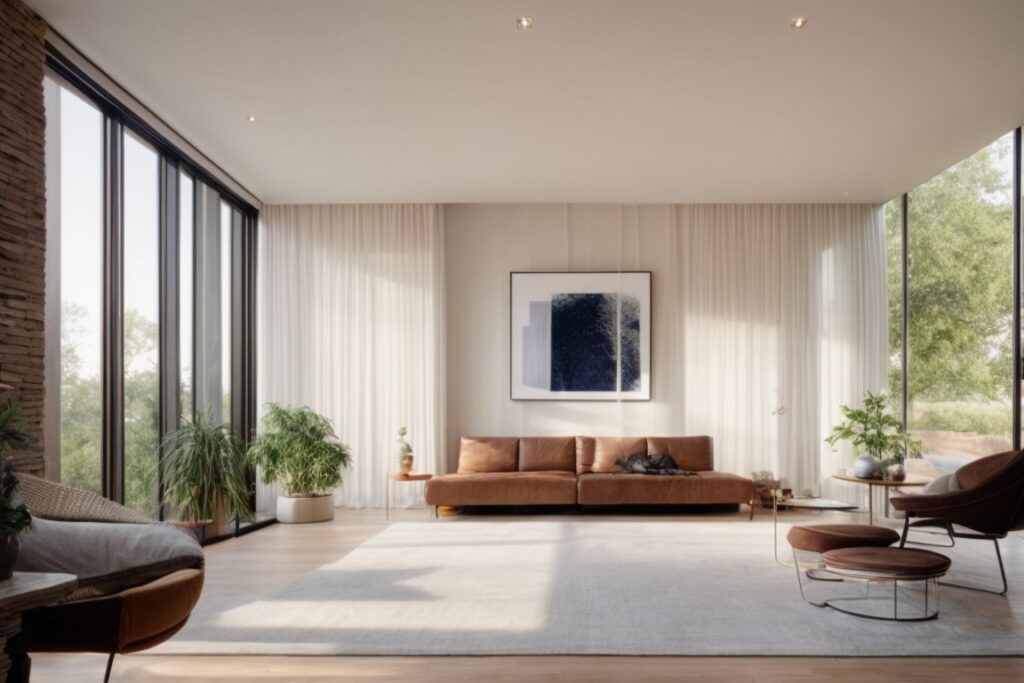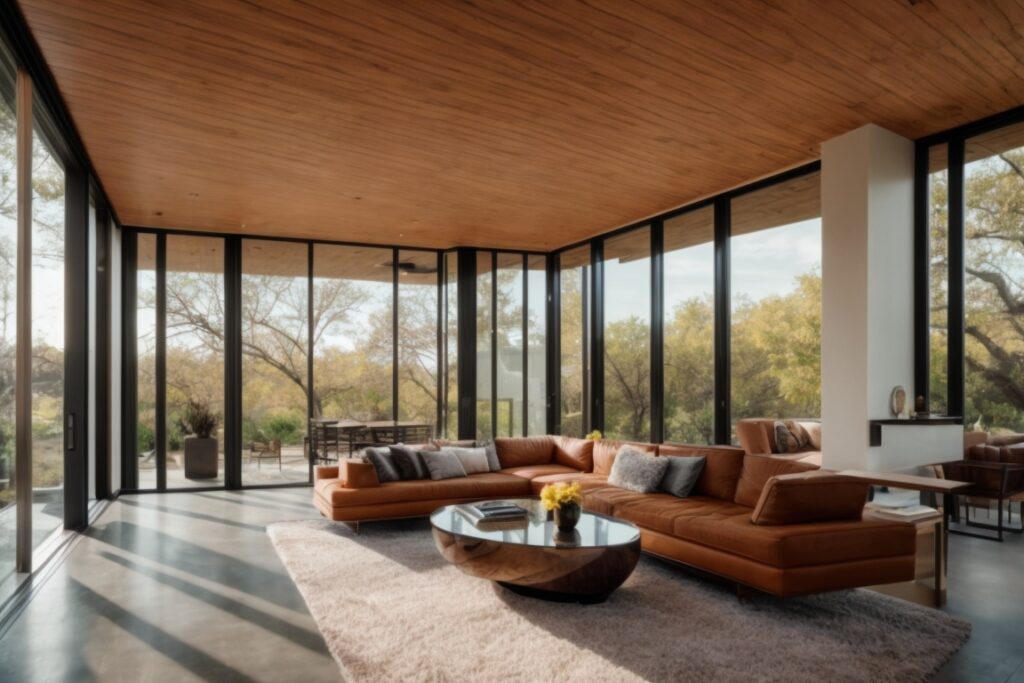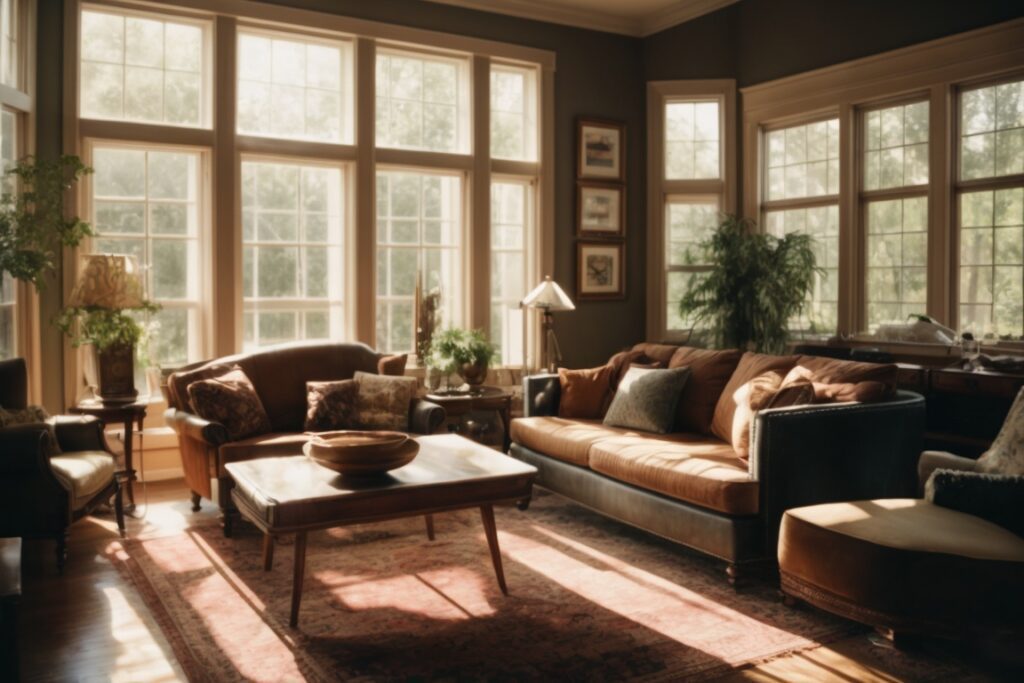Eco-Challenges in Residential Living
In the bustling city of Dallas, residents are increasingly confronting a pressing environmental issue that hits close to home—literally. The problem begins with the sun’s rays streaming through windows, a familiar sight in the expansive Texas landscape. However, this natural light does more than just brighten rooms; it significantly increases the indoor temperature. This phenomenon, known in Dallas and beyond, is leading to a surge in energy consumption as households turn to air conditioning to combat the resultant heat, thus raising a critical question about sustainability and energy efficiency.
This issue is magnified in Dallas, where the mercury often climbs, and the sun seems to shine with a vigor matched only by the hospitable spirit of its residents. With residential window tinting in Dallas not yet a standard practice, the reliance on cooling systems becomes not just a matter of comfort but of environmental concern. Traditional energy consumption contributes to the city’s carbon footprint, a shadow that grows longer with each summer. The effects are manifold, from increased energy bills for residents to a greater strain on the city’s power grid, which still heavily relies on nonrenewable energy sources.
Moreover, the lack of efficient window tinting in homes across Dallas exacerbates this problem, as untreated windows offer little resistance to the sun’s rays. This scenario presents a dual challenge: on one hand, the need to keep homes cool and comfortable; on the other, the imperative to do so in a manner that aligns with growing environmental consciousness. As residents of Dallas seek solutions to mitigate these impacts, the quest for energy-efficient, eco-friendly alternatives becomes more pronounced, highlighting the urgent need for a sustainable approach to residential living in the face of climate realities.
Understanding the Roots of Energy Inefficiency in Homes
The genesis of energy inefficiency within residential settings, particularly in a sun-soaked city like Dallas, begins with one often overlooked aspect: windows. While windows serve crucial roles in ventilation and natural lighting, they can also be significant contributors to energy waste. The issue is twofold. First, conventional windows allow an extensive amount of solar heat to enter the home, escalating indoor temperatures and, consequently, the demand on air conditioning systems. This surge in energy consumption not only spikes utility bills but also increases the household’s carbon footprint.
On the flip side, these same windows can be poor insulators against heat loss during cooler months, further straining heating systems. The root problem lies in the basic design and materials of many residential windows, which are not optimized for energy efficiency. Over time, this inefficiency becomes a persistent issue, driving up energy costs and contributing to the larger problem of excessive energy use in the residential sector.
The Environmental and Financial Cost of Skipping Window Tinting
Ignoring the benefits of residential window tinting in Dallas not only increases your carbon footprint but also elevates your energy bills significantly. Inefficient energy use due to poor insulation results in excessive use of heating and cooling systems, directly impacting the environment and leading to higher utility costs. This neglect contributes to the larger issue of energy wastage and environmental degradation, positioning homeowners as contributors to the problem rather than part of the solution.
Feeling the Heat: The Real Cost of Skipping Residential Window Tinting in Dallas
In the heart of Dallas, where the sun blazes with an intensity unmatched, the absence of residential window tinting might seem like a trivial oversight. But what starts as a minor inconvenience swiftly escalates into a relentless assault on your comfort and wallet. As the unfiltered sunlight pours into your home, it’s not just the glare on your television screen that’s aggravating. The real issue runs much deeper, impacting areas of your life you’ve probably never paused to consider.
Imagine the relentless Texas sun as an unwelcome guest, turning your sanctuary into a sweltering greenhouse. Without the protective barrier of window tinting, this invasive heat permeates your living space, forcing your air conditioning to work overtime. The strain doesn’t only manifest in your skyrocketing energy bills; the constant demand on your HVAC system can lead to premature wear and tear, hinting at costly repairs or replacements down the line. But the financial drain is just one facet of the problem.
Consider the long summer days, with the sun’s rays relentlessly fading your furniture, artwork, and cherished photographs. The damage is gradual, almost imperceptible day to day, but over time, the loss is irreplaceable, stripping away the vibrancy and value of your belongings. This degradation of your home’s aesthetics and the climb in operational costs are not just nuisances but glaring indicators of a larger, more pressing issue—the unsustainable energy consumption that amplifies your carbon footprint, distancing you further from eco-friendly living ideals.
The discomfort and financial implications of ignoring residential window tinting in Dallas are significant, yet the environmental cost is perhaps the most disconcerting aspect. As you grapple with these repercussions, it becomes evident that what seemed like a small oversight may indeed cast a long, costly shadow over your home and lifestyle.
The Urgency of Adopting Residential Window Tinting in Dallas
In the bustling and vibrant city of Dallas, where the sun blazes for the better part of the year, the urgency of adopting residential window tinting cannot be overstated. The city’s residents are continuously battling the twin demons of rising energy costs and an increasing carbon footprint, making the need for energy-efficient solutions a pressing concern.
This urgency is further amplified by the imminent threat of global warming, which makes the pursuit of eco-friendly living options not just a personal preference but a global necessity. With every passing day, the window of opportunity to make a significant impact on our planet’s health narrows, lending an element of timeliness to the adoption of window tinting solutions. Delaying the decision to install energy-efficient window tints in Dallas homes means higher energy consumption and a bigger carbon footprint, directly contributing to environmental degradation. Acting swiftly to integrate window tinting into our homes is, therefore, critical for both personal savings and planetary well-being.
Reduce Your Energy Costs and Carbon Footprint with Residential Window Tinting in Dallas
Every homeowner in Dallas knows the challenges of keeping their home cool and energy-efficient, especially during those brutally hot summer months. The logic is simple: traditional windows allow for significant solar heat gain, causing your air conditioning system to work overtime and your energy bills to skyrocket. Residential window tinting presents a straightforward, effective solution. It minimizes solar heat gain, significantly reducing your reliance on air conditioning. The result? Lower energy costs and a smaller carbon footprint. By choosing window tinting, you’re not just saving money; you’re contributing to a more sustainable future.
Residential Window Tinting in Dallas: The Clear Solution to Eco-Friendly Living
In the vibrant city of Dallas, where the sun shines brightly and the energy bills soar high, residential window tinting emerges not just as an option, but as the unequivocal solution for eco-conscious homeowners. It’s a sophisticated, yet simple way to significantly reduce your carbon footprint and your monthly energy expenses.
By choosing residential window tinting in Dallas, you’re not merely opting for a service; you’re embracing a lifestyle change that aligns with the principles of sustainability. This innovative solution efficiently blocks out excessive heat, reduces dependence on air conditioning, and ensures your home stays comfortable all year round without an excessive energy draw.
It’s not just about energy efficiency; residential window tinting also protects your interiors from harmful UV rays, preserving the life of your furnishings and reducing the need for replacements. This further amplifies its role in promoting an environmentally friendly living environment.
Imagine your home, cooler during the sweltering Dallas summers and warmer in the chilly winters, all the while saving money on energy bills and contributing to the planet’s well-being. This is not a distant dream, but a tangible reality with residential window tinting. It’s an investment that pays dividends not only to your pocketbook but to the planet as well.
In the spirit of pursuing a greener lifestyle in Dallas, incorporating residential window tinting into your home is a powerful step forward. It’s a clear statement of your commitment to eco-friendly living, showcasing that you are part of the solution to the environmental challenges we face. Embrace residential window tinting in Dallas and transform your home into a beacon of sustainability.
Embracing Sustainability: The Role of Residential Window Tinting in Dallas
Why consider residential window tinting in Dallas as a go-to solution for both reducing your carbon footprint and energy costs? The answer lies in its outstanding ability to minimize heat transfer through windows. This innovative solution works by reflecting and absorbing a significant portion of the sun’s heat and ultraviolet rays before they enter your home. As a result, the indoor temperature remains more stable, reducing the reliance on air conditioning units and heaters. This translates into lower energy consumption and, consequently, reduced greenhouse gas emissions—key factors in promoting environmental sustainability.
Moreover, residential window tinting also defends your interiors against the sun’s harmful ultraviolet rays, which can fade and damage furniture, floors, and artworks. By opting for window tinting, you’re not only safeguarding your belongings but are also embracing an eco-friendly lifestyle. This makes residential window tinting in Dallas an ideal choice for those looking to contribute to the environment’s health while enjoying the comfort of their homes.
Enhancing Home Comfort and Aesthetics
Opting for residential window tinting in Dallas goes beyond energy savings and a smaller carbon footprint. It significantly improves indoor comfort by reducing uncomfortable hot spots and glare that can disrupt your daily life. Additionally, window tinting offers a layer of privacy without sacrificing natural light. This enhancement can also elevate the aesthetic appeal of your home, giving it a sleek, modern look while protecting your belongings from the fading effects of sunlight. These advantages make window tinting not just a practical choice for eco-conscious homeowners but also a smart investment in enhancing the overall quality of living space.
Leading the Way with Residential Window Tinting in Dallas
In an era where environmental concerns and energy efficiency are more significant than ever, homeowners are constantly exploring smart solutions to mitigate these challenges. The sun in Dallas does more than just brighten our days; it also elevates our energy bills and carbon footprints, making eco-friendly living seem like a distant goal.
However, residential window tinting leaps out as an intelligent option for those ahead of the curve. It’s not merely about reducing the glare on your television screen; it’s about embracing a sustainable lifestyle without compromising on comfort. The foresight to invest in window tinting is the hallmark of a homeowner who is not just reacting to the environment but strategically responding to it.
This choice embodies more than just a temporal benefit; it signifies a commitment to a greener, more efficient home. By opting for residential window tinting in Dallas, you’re not just curbing the relentless Texas heat; you’re also reducing your reliance on air conditioning, thereby decreasing your energy consumption and contributing to a healthier planet.
The action of choosing window tinting is a testament to intelligent, eco-conscious living. It’s a subtle nod to the belief that embracing eco-friendly measures is not just beneficial but essential for a sustainable future. In Dallas, where the sun reigns supreme, making such a choice is not just sensible; it’s a proactive step towards an energy-efficient, environmentally friendly home lifestyle.
In conclusion, while the decision to tint your residential windows in Dallas might seem like a minor adjustment, its implications are profound. It reflects a broader commitment to eco-friendly living and energy efficiency, highlighting the role of intelligent choices in navigating the challenges of modern living. As such, the movement towards residential window tinting in Dallas is not just a trend but a reflection of a forward-thinking approach to home improvement and environmental stewardship.
Reduce Your Footprint, Enhance Your Comfort
Make the eco-friendly choice today and transform your Dallas home with residential window tinting. Not only will you reduce your carbon footprint, but you’ll also enjoy lower energy costs and enhanced indoor comfort year-round. Don’t wait to make a difference for the environment and your wallet. Contact us now for professional window tinting services and start living more sustainably!







About The Author: Mike Kinsey
Mike Kinsey possesses a deep knowledge of the window tinting industry which backed by an extensive background in project management and construction. For the past ten years, Mike has been working as the Operations Manager at Window Film Dallas. He and his team have installed over 250,000 square feet of window film for homes and buildings in the Dallas/Fort Worth metropolitan area. Mike's knowledge of the climate and environmental conditions in which he operates as well as the architectural needs of buildings in the area give him the ability to select the perfect film in every situation. He is well versed in the industry's best practices and is up to date on the latest innovations. On top of his vast product knowledge, Mike is certified by 3M, EnerLogic, and AIA for continuing education.
More posts by Mike Kinsey